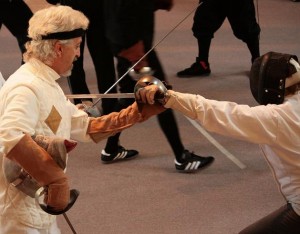Fencing Criticism and Feedback for Dummies…
Fencers? Cocky? Never!
I recently witnessed an Internet discussion on fencing that rapidly degenerated into bad blood. Using my best sarcastic voice, I hereby state, “It may surprise the world to learn that fencers are notoriously cocky and prone to confrontation.”
Any fencing teacher can watch a fencing match and provide valid criticism and feedback. Regardless of the quality of the fencing in question, how your criticism is delivered tells the world what kind of person you are. More specifically, they get a window into how you might treat your own student.
If your goal is to humiliate and punish the student you are certainly welcome to say whatever you like, but I have a three-point system for delivering feedback based on my experiences training for the fencing master’s program.
Puck’s 3 Rules for Corrective Feedback
- Precise – Feedback should not be vague. “Fix your arm” is not an acceptable correction from a fencing teacher. That could mean anything. You do not want the student trying to guess what they should correct. “Extend your weapon arm first during the lunge;” “In the guard create a straight line from elbow to weapon tip;” “Close the line when striking.” These are all specific corrections tightly focused on the problem.
- Concise – Nothing breaks up the tempo of a fencing lesson like veering off into an extended discussion of tangential theory. There is a place for extended discussion, but on the floor a short and precise explanation preserves the flow of the lesson. Don’t let your fencer’s legs cool off while you wax poetic about the joys of striking in countertime. Importantly, don’t lecture while the student is on guard. If you are going to provide anything more than short feedback, put them into a resting posture like first position. Don’t spend sweat and energy having your student hold a guard as you prattle when you could spend that energy on fencing actions.
- Nice – This seems obvious, but it bears repeating. Don’t be a jerk when you deliver your correction. As a fencing teacher, you are engaged in the process of creating a skilled fencer. Like any person responsible for creation there will be challenges in the process. It is a poor artist that wrecks his own canvas. There is often a natural and friendly antagonism between the fencing master and the student, but the goal of the teacher should always be to build the student and not to destroy them.
Both fencing and teaching are very rewarding. Nothing worth doing is easy all the time, but if we can take a bit of time to treat each other with respect and focus on building better fencers we will all benefit.
~P.



What do you think?
You must be logged in to comment.